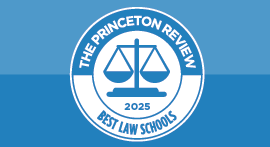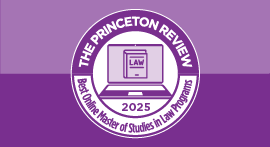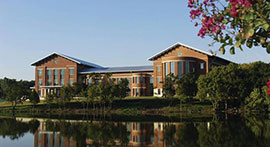From the School
The University at Buffalo School of Law—the only law school in the State University of New York (SUNY) system—is a premier public law school, situated on the campus of a flagship university. As one of the oldest law schools in New York State, UB School of Law draws on more than 135 years of experience and innovation in legal education. UB is among the most internationalized universities in the United States, providing numerous programs and services to support its diverse student body. The School of Law shares this commitment and welcomes students from wide-ranging backgrounds into its vibrant and collegial community.
Overview
From The School
The admissions process is selective and based on both quantitative and qualitative criteria. In addition to an applicant's standardized test score (LSAT or GRE score) and undergraduate grade point average, the Admissions Committee considers non-numerical factors in reaching decisions. These factors include achievements and activities that indicate a high level of probability of scholastic excellence and the potential for contributing to the enrichment of the law school community.
Test Scores
(enrolled students)
Application Process
Other Admission Factors
LSAT Score
Undergraduate GPA
Letters of Recommendation
Essay / Personal Statement
Selectivity Rating
Overall
From The School
Degrees Offered
Our flexible JD curriculum affords students a broad range of curricular options, practical coursework, and special programs to prepare them for practice. We offer a large number of interdisciplinary courses in a variety of concentrations and curricular programs, including Advocacy, Criminal Law, Cross-Border Legal Studies, Family Law, Intellectual Property and Privacy Law, International Law, Sports Law, Environmental Law, and Finance and Development. Many law students simultaneously pursue the JD degree and a PhD or master's degree through one of our many dual degree programs.
We offer five programs for students who already have a first degree in law, including an Advanced Standing Two-Year JD for Internationally Trained Lawyers, a General LLM, a Criminal Law LLM, a Cross-Border Legal Studies LLM, and a JSD.
Programs and Curriculum
Our experiential learning opportunities, which give students the opportunity to learn by doing, include our clinical programs, practicum courses, externships and judicial clerkships, law journals, as well as our Center for the Advancement of Sport, our New York City Program in Finance and Law, and our Pro Bono Scholars Program and Pro Bono Appeals Program. Students learn how to prepare and try a civil or criminal case through our Advocacy Institute or compete in one of our national moot court competitions. Several opportunities exist for international study led by our faculty, or through our study abroad programs.
Faculty
The School of Law's faculty has long been associated with innovative, interdisciplinary research and critical approaches to the study of law. Many hold doctorates in areas other than law and are actively engaged with research, policy and practice. Our low student-to-faculty ratio — 7.9:1 — allows students and professors an opportunity to get to know one another.
Faculty Information
Students Say
Buffalo offers “plenty of opportunity to get hands-on experience in legal jobs during law school.” Traditional academics are augmented by “diverse opportunities for experiential learning,” including “non-traditional course offerings like clinics and externships.” Within the law school, “there are countless opportunities for moot court, trial team, and journal work,” and “the law school’s clinic program is excellent.” Of particular note, “the school goes out of its way to help those interested in Public Interest work,” with numerous clinics devoted to affordable housing, community economic advocacy, and social justice. Over 50 percent of each graduating class works in private practice. Even so, some would also like to see the school build a “stronger presence in the greater Buffalo community,” and point out the campus’s isolated location in a northern suburb of the city. The events and culture generated from having over 24,000 undergraduate and graduate students on Buffalo’s campus should not be discounted, though.
When it comes to the teaching staff, students praise Buffalo’s “terrific adjunct professors,” saying they love being taught by “faculty members who are still trying cases, rather than those who have been out of court for years.” The school attracts a number of accomplished attorneys, and “some of the faculty [are] at the very pinnacle of their fields, with reputations that span the country.” A current student enthuses, “On multiple occasions, my professors have actually worked on the cases we cover in class.” Despite their many accolades, “faculty is hit or miss” in the classroom. Because SUNY is a “great research institution,” it tends to attract “professors that are experts in their field with a significant amount of publishing in their background, but have no teaching skills and no ability to relate to the students.” Outside of the classroom, teachers are diverse in the same manner. Some professors are friendly and student-oriented, while others “are not always accessible because they are busy.”
Buffalo is a great choice for local lawyers, and the school maintains a great “reputation in New York, particularly in western New York.” For many local students, cost was also a major factor in their decision to attend SUNY Buffalo. New York state residents not surprisingly, comprise more than 90 percent of the school’s population, but the Law School offers competitive scholarships for qualified applicants whether in-state or out-of-state residents.
Career overview
From The School
Through student interview programs, career panel discussions, and one-on-one counseling, the Career Services Office (CSO) helps students prepare for a successful and satisfying legal career. Students and alumni have access to an online platform that is used to post employment opportunities, schedule interviews, and provide resume writing and interviewing resources. An extensive network of alumni participate in mentoring programs that provide professional advice and guide students throughout their law school career.
Career Services
Graduates Employed by Area
Graduates Employed by Region
Prominent Alumni
Overview
From The School
2023/24 New York State Residents:
$26,170 Tuition
$3,078 University Fees
$22,762 Room, Board, Living Allowance
$52,010 Total
2023/24 Non-New York State Residents:
$31,160 Tuition
$3,078 University Fees
$22,762 Room, Board, Living Allowance
$57,000 Total
https://www.law.buffalo.edu/admissions/financing.html
After living in the state for 12 months, domestic non-New York state residents can apply for in-state residency.
Financial Aid:
Federal loans are available to domestic students who complete the Free Application for Federal Student Aid. Eighty-nine percent of incoming three-year JD students received merit-based scholarships in 2023, ranging from $2,000 per year to full tuition. All merit scholarships last for the duration of the academic program, provided students are enrolled full-time and remain in good academic standing.
Dates
Financial Aid Statistics
Expenses per Academic Year
Overall
From The School
UB law students experience a collegial and collaborative atmosphere. Student organizations are an integral part of the UB Law experience, providing students with an opportunity to gain new skills, and contribute time and talent in ways that are both personally and professionally gratifying.
Student Body Profile
Demographics
Campus Life
Students Say
Within the law school, there are “myriad, valuable student organizations.” Socially, one student proclaims, “There are always SO many events going on, it is literally impossible to keep up,” especially since the law school is located on the University at Buffalo campus with an enrollment of over 24,000. In contrast, there isn’t much happening in the surrounding area. Located in “suburban hell,” campus is north of Buffalo proper with“nothing in walking distance. You have to drive everywhere to get or do anything.” Not only is “there is no ‘college town’ feel,” students remind us that “the heart of Buffalo's legal community, including the state and federal courthouses and the major law firms, remains in downtown Buffalo.”
More Information
Admissions Office Contact
From The School
Campus and Location
The School of Law is located on UB's North Campus in suburban Amherst, N.Y., approximately 11 miles northeast of downtown Buffalo, and 19 miles southeast of Niagara Falls. The land on which the University at Buffalo operates is the territory of the Seneca Nation, a member of the Haudenosaunee/Six Nations Confederacy.
With an enrollment of over 32,000, UB is the largest and most comprehensive campus in the SUNY system. Home to just 445 students, the School of Law has a small-school feel with all the advantages of a large interdisciplinary university.
As the second-largest city in New York State, Buffalo offers a wide variety of social and cultural activities, and easy access to Canada. Voted America's Friendliest City by Travel & Leisure Magazine, Buffalo is known as the City of Good Neighbors, as well as one of the most affordable cities in the United States.
Facilities
UB School of Law is housed in John Lord O'Brian Hall. The Charles B. Sears Law Library and the Francis M. Letro Courtroom are both located in the law school. Recent renovations to O'Brian Hall include three new state-of-the-art classrooms, and a new dressing room facility where students can prepare for job interviews or mock trial competitions. Exclusive law student space is also available on campus including a student lounge on the first floor of O'Brian Hall. Abundant green spaces complement the 125-building campus including Lake LaSalle and Letchworth Woods.
Vice Dean for Admissions
Buffalo, NY 14260


















